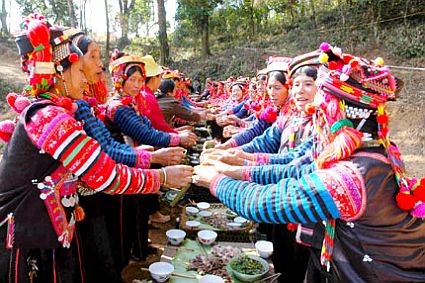(VOVworld) – The rain blessing ceremony is one of 7 annual festivals of the Ha Nhi. It takes place at the end of the summer when rice and maize are maturing. Rituals at the rainy season festival are typical of people dependent on agriculture. They pray to the genies of agriculture, rain, and water to bless them with bumper crops, animal reproduction, a prosperous life, and health for their people.
 |
People have meal together after a festival
|
The Ha Nhi grow rice on terraced fields and worship the genies of agriculture, rain, and water. While the Kho Gia Gia crop blessing ceremony prays to the genies of land, water, forest, and trees every three years, the rainy season festival is an annual event dedicated to the rain genie. In some Ha Nhi villages, they worship the rain genie at the Kho Gia Gia ceremony.
Luong Van Thiet, a folklorist with the Vietnam Museum of Ethnology, says: “The rainy season festival is organized in June, the hottest month of the summer. In our experience, we must increase water to the terraced fields for the crop to grow best and yield a full harvest. The ritual shows our harmonious interaction with nature. The ceremony ensures good weather for planting.”
If the dry season persists, the Ha Nhi may organize 2 or 3 rain blessing ceremonies in a year to pray for the rain genie’s protection and blessing. The offering consists of a black pig or a black buffalo.
On the day of the ceremony, families wake up early to prepare offerings of pork, glutinous rice cakes, plain rice, wine, ginger porridge, green tea, sugarcane, banana, and flowers. They place the offering in the most fertile field and the rite is performed by a prestigious man from early morning until noon. After the ceremony they distribute the offering among family members. Some Ha Nhi villages in the high mountain provinces of Dien Bien, Lai Chau, and Lao Cai have maintained the traditional rite, but other villages have combined it with more festive activities.
Luong Van Thiet again: “The rain blessing ceremony now is not as cumbersome as in the past. There are fewer taboos and rules. Besides the traditional offering, we have confectionary and fruit. In the past we had home-made wine in bamboo tubes. Now we buy bottles of wine at the market. But the solemn, pure, and respectful atmosphere is unchanged.”
In the past the rite took place in a field. Now they organize it in the garden of the village chief or the best farmer. After the rite they play folk games, sing, and dance. Each family prepares wine and food to welcome relatives and guests. This is an occasion for family reunions and enhancing community bonds.